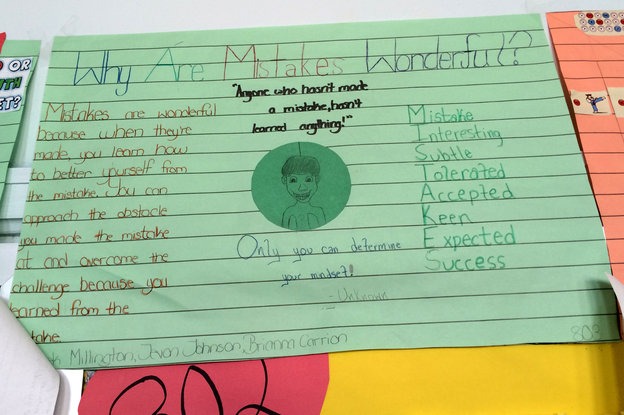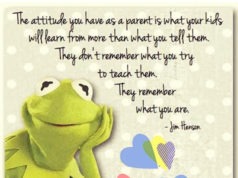It’s become the new buzz phrase in education: “Got grit?”
Around the US, schools are beginning to see grit as key to students’ success — and just as important to teach as reading and math.
Experts define grit as persistence, determination and resilience; it’s that ‘je ne sais quoi’ that drives one kid to practice trumpet or study Spanish for hours — or years — on end, while another quits after the first setback.
“This quality of being able to sustain your passions, and also work really hard at them, over really disappointingly long periods of time, that’s grit,” says Angela Duckworth, a psychology professor at the University of Pennsylvania who coined the term “grit” — and won a MacArthur “genius grant” for it. “It’s a very, I think, American idea in some ways, really pursuing something against all odds,” she says.
Duckworth says that her research shows grit is actually a better predictor of success than IQ or other measures when it comes to achievements as varied as graduating West Point or winning the National Spelling Bee.
Even the Obama administration is now on the “grit” bandwagon. A 2013 report from the Department of Education laments that kids are learning to “do school,” but aren’t learning the skills they need in life.
But can grit be taught?
“I hope so,” says Duckworth, “but I don’t think we have enough evidence to know with certainty that we can do so.” Part of the problem is figuring out how to assess grit. Duckworth says “these things are really hard to measure with fidelity.”
Even so, many schools around the nation have embarked on their own experiments — they see the promise of the concept too great to wait.
Letting Kids ‘Hit The Wall’
Jason Baehr, a philosophy professor at Loyola Marymount University, recently launched the Intellectual Virtues Academy in Long Beach, Calif. It’s a charter middle school that’s a kind of petri dish for grit, along with other so-called virtues like intellectual courage and curiosity.
“This is all anecdotal at this point,” Baehr says. “But I’ll say from our experience in the school, I see [kids learning to be grittier] all the time. … You can create a classroom culture in which struggle and risk-taking is valued more than just getting the right answer.”
One way to make kids more tenacious, the thinking goes, is to show them how grit has been important to the success of others, and how mistakes and failures are normal parts of learning — not reasons to quit.
That message underlies every lesson at the Lenox Academy for Gifted Middle School Students in Brooklyn, N.Y., a public school that has been trying to make kids grittier for the past three years. On a recent day, in a typical lesson, a social studies class is studying Steve Jobs. Kids raise their hands to offer examples of Jobs’ grit.
“He had failed one of the Mac projects he was creating,” says one student.
“He used his mistakes to help him along his journey,” says another.
Students also get practice being gritty themselves. When a kid struggles to answer a question, for example, teachers resist the urge to swoop in and offer hints. Instead, they let students squirm a little through an awkward silence. The idea is to get kids comfortable with struggle so they see it as just a normal part of learning.
Tom Hoerr leads the New City School, a private elementary school in St. Louis that’s also been working on grit. “One of the sayings that you hear around here a great deal is, ‘If our kids have graduated from here with nothing but success, then we have failed them, because they haven’t learned how to respond to frustration and failure.’ “
After years of focusing on the theory known as “multiple intelligences” and trying to teach kids in their own style, Hoerr says he’s now pulling kids out of their comfort zones intentionally.
“The message is that life isn’t always easy,” Hoerr says. His goal is to make sure “that no matter how talented [students are], they hit the wall, so they can learn to pick themselves up, hit the wall again and pick themselves up again, and ultimately persevere and succeed.”
It is a major adjustment for everyone — perhaps most of all for parents. “It’s really easy to talk about in the abstract,” Hoerr says. “Parents love the notion of grit, they all want their kids to have it. However … no parent wants their kid to cry.”
Changing Mindsets To Help Kids Persevere
In order to get parents and kids on board with the idea of struggle, educators say, they first need to be convinced that their struggle is likely to pay off. Or, as Stanford University professor Carol Dweck puts it, they need to have a “growth mindset,” the belief that success comes from effort, and not a “fixed mindset” — the notion that people succeed because they are born with a “gift” of intelligence or talent.
“It’s really hard to have high tolerance if you believe that your abilities or intelligence are fixed,” says Eduardo Briceno, CEO of Mindset Works, a company he co-founded with Dweck. “Because if you believe, ‘I can’t change my own abilities,’ then trying hard doesn’t make any sense. It’s like pounding your head against the wall.”
Indeed, educators say they see it all the time: Kids with fixed mindsets who think they just don’t have the “gift” don’t bother applying themselves. Conversely, kids with fixed mindsets who were always told they were “gifted” and skated through school tend to crumble when they hit their first challenge; rather than risk looking like a loser, they just quit.
“Kids came to our middle school, and when that curriculum got tough, a majority of them retreated,” says Joe Giamportone, assistant principal of Lenox Academy. “Performance declined over the course of three years.”
Seventh-grader Jamal Parris is typical. After coming to Lenox Academy, he began to struggle in math.
“I started thinking that I wasn’t that smart and I didn’t deserve to make it into this school,” says Parris. “When I was in fifth grade, I used to be so good at math. And then when I came to Lenox Academy, like, I just hit a wall. I was like, ‘Whaaat? Letters in math?!’
“I couldn’t understand anything,” he continues. “Some days I wouldn’t even go home to study, because I was like, ‘I’m just gonna get a low grade anyway, even if I study.’ “
That’s what launched Giamportone on a kind of crusade three years ago to root out that kind of fixed mindset. Since then, he says, everyone at school has done such a mental and cultural 180 that even the very name of the Lenox Academy for Gifted Middle School Students is like a dirty word.
“We don’t use the word ‘gifted’ — ever,” Giamportone says. “In our school you will never hear it.”
” ‘Smart’ is like a curse,” adds social studies teacher June Davenport.
Instead, the school is plastered with signs and handmade posters promoting a “growth mindset.”
“This is a term in every class: ‘Use the growth mindset. Have the growth mindset,’ ” says eighth-grader Alina Blaze. “You can put forth the effort to get something that you want.”
The message is not unlike what Grandma always said: “You can do anything,” “Just practice, practice, practice,” and, “Don’t give up!” But Blaze says what convinced her was the science.
The Mindset Works curriculum starts with Brainology, a kid-friendly computer-animated crash course in how the brain works like a muscle; the more you use it, the stronger it gets.
“I learned how, every single day, the more you learn things, the more neurons that pop out of your brain,” says sixth-grader Nyashka Laurore. Even after a few lessons, she says, she stopped feeling like school was just something she couldn’t do.
Changing Approaches In The Classroom
The focus is always more on putting out effort than on getting the right answers. Teachers have been trained to change the way they see students, and how they speak to them.
Kids no longer hear “You’re so smart!” or “Brilliant!” Rather, teachers praise students for their focus and determination. “You must have worked really hard!” or “To have performed this well, you must have put out a lot of effort.”
The adjustment isn’t always easy for teachers trained to focus on hitting high scores on standardized tests. “It’s really hard in certain subject areas to say that your process is more important than your product,” says science teacher Nicole Trubnikov. “But that is the underlying principle of this program — to say that it’s all the effort that you put in that’s most important.”
Some schools even grade students on “growth mindset” and “grit.” It doesn’t make it onto report cards at Lenox, but kids do get evaluated on it in class by teachers — and by other kids.
In one history class, for example, eighth-graders observe their classmates discussing a reading passage, and then rate them on things like “learning from past mistakes.”
“Normally, Timothy, he likes to talk to his friends outside of the group and, like interrupt, and he don’t pay attention that well, but he’s able to take charge,” offers one student.
“If I was an outsider and I was hearing this conversation, I might think that this was some kind of hippie-dippy love fest,” concedes the teacher, Nathan Curley. “But what you see is actually a more rigorous and risky learning environment.”
In three years, Curley says he’s seen kids grow less afraid of making mistakes, and more willing to ask for help. Test scores at Lenox have jumped 10 to 15 points.
The Latest Fad In Education?
The number of schools using Brainology is expected to double this year, from 500 to 1,000. But even Briceno concedes they are still just small islands in a culture that may give lip service to earning an “A for effort,” but that still rewards grades and scores above all.
Angela Duckworth, the grit guru who’s also experimenting with making middle-schoolers grittier, agrees. A limited intervention, she says, if not consistently reinforced in and out of school … can only have limited results. “We don’t know whether we’ve had any effect — the jury’s out,” says Duckworth. “It just seems to me extremely implausible that that’s going to permanently and impressively change a child.”
Indeed, even after three years at Lenox Academy, sometimes all it takes is one bad test score for kids to lapse back into the old mindset of “I’m just not good at math.”
“Grit as a goal seems to be multiply flawed and very disturbing,” says education writer Alfie Kohn. For starters, he says, “the benefits of failure are vastly overstated, and the assumption that kids will pick themselves up and try even harder next time, darn it — that’s wishful thinking.”
Kohn sees the focus on grit as just the latest fad in education that will soon “burn itself out,” like many have before. He doesn’t believe that kids today are any less gritty than before. And he says the research showing that gritty people tend to be more successful doesn’t really offer any new insight. As Kohn put it, “It’s a pure circular assumption, like persistent people persist.”
Besides, Kohn says, if there’s a problem with how kids are learning, the onus should be on schools to get better at how they teach — not on kids to get better at enduring more of the same.
“Grit’s taken off as a fad in education, because that’s a convenient distraction that doesn’t address the pedagogical and curricular problems in the schools,” he says. “But the more we focus on [grit] … the less likely it is that we make kind of changes that can help our children go to better schools.”
Some have also raised concerns about grading kids on grit and with calling grit a “good character trait” or a “virtue.” As University of Pennsylvania education professor Joan Goodman puts it, those are very loaded words with moral overtones.
“The language is important, because you’re talking about virtues, you’re talking about character, and … you don’t want to generate the notion that you are a bad kid if you are not gritty, and you’re a good kid if you are,” says Goodman.
Besides, Goodman says, grit may not be a character trait at all, but rather a byproduct of other traits, like confidence, courage and curiosity. And, she says, people can be gritty in some things but not others. A kid might be passionate about chess, for example, but completely disengaged in chemistry class.
That’s a point well taken by Duckworth. She agrees that schools, teachers and parents all share in the responsibility to help inspire kids so they’re intrinsically motivated.
“I don’t think people can become truly gritty and great at things they don’t love,” Duckworth says. “So when we try to develop grit in kids, we also need to find and help them cultivate their passions. That’s as much a part of the equation here as the hard work and the persistence.”
It’s a little bit of a chicken-and-egg kind of question. Passion may drive kids to be gritty, but being gritty and able to tolerate failure also enables kids to develop and pursue a passion.
Just ask eighth-grader Alina Blaze. Several years ago, she quit the viola out of fear she would embarrass herself. “I found it so difficult to learn, and I said, ‘I’m just not good at this, so I might as well not try,’ ” she says. “And soon enough, I just put my viola up there on top of the closet, and that was the end of that.”
But now, three years into the growth-mindset training at Lenox Academy, Blaze says, she believes “you can teach old dogs new tricks.”
“I think that if I just put in enough effort I can be the next Yow Ming,” she declares. As her classmates begin to giggle beside her, she stammers, “I mean, Yo-Yo Ming. I mean, Yo-Yo Ma!”
Mistakes like that one will always be embarrassing, Blaze says. But now, she recovers more easily. She’s one who got the message, as they say around here, that the secret to success is failure.
Sources: NPR
{jathumbnail off}








